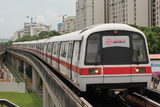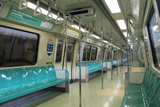Siemens 651
Siemens C651 are the second generation of trains running on the North–South Line and the East–West Line. These trains were manufactured from 1993 to 1994 by Siemens AG under the Contract 651.
Some of the trains are undergoing/had underwent mid-life refurbishment program by Singapore Rail Engineering.
History
As part of some experimental programs in the late 1990s and early 2000s, some trains were fitted with more standing space between the doors of the second and fifth cars with 3 of the 9 seats removed and seats in the third and fourth cars replaced with upholstered cushion in an attempt to provide a degree of comfort to passengers standing in that space. However, the upholstered cushion was revert to original seats in 2006. Some trains also features grab poles that branch out into three in 2007.
Refurbishment
Refurbishment contract for these trains have been awarded to Singapore Rail Engineering (SRE). When completed, these upgrades will address train components such as doors and brakes that have been the primary cause of delays owing to train faults. The changes will include re-signalling, refurbishing the propulsion system, air-conditioning system, auxiliary power system, interior saloon with modifying handrails and exterior of the trains.[1][2]
Refurbishment works has begun since early 2016 and is expected to undergo dynamic tests and commence revenue service in early 2018.[3]
Design/Features
| Initial | Refurbishment | ||
|---|---|---|---|
DT M1 M2 M2 M1 DT |
TBC | ||
| Exterior Design | |||
| Livery | White with red strip | SMRT Pixelised Livery | |
| Train Run Number | Green Flipdot | TBC | |
| Interior Design | |||
| Seating Capacity | Original | Modified | TBC |
| 336 (332 after signalling upgrade) | 372 (368 after signalling upgrade) | ||
| Wheelchair Bay | N/A | TBC | |
| Door Closing Indicator Lights | N/A | TBC | |
| System | |||
| Safety System | ATC, ATO, ATP, ATS (after signalling upgrade) | ATC, ATO, ATP, ATS | |
| Signalling System | Fixed Block Communication Based Train Control (after signalling upgrade) |
Communication Based Train Control | |
| Traction Control | GTO–VVVF PWM (Siemens) | IGBT-VVVF (Toshiba PMSM) | |
Fleet Numbering
The car numbers of the trains range from x201 to x238, where x depends on the carriage type.
- The first digit identifies the position of the car from the closest end of the train; where ‘3’ represents first car, ‘1’ represents second car and ‘1’ represents third car.
- (Example) Passenger Vehicle 237/238 would consist of 6 cars with serial number 3237, 1237, 2237, 2238, 1238 and 3238 respectively.
- Depending on the direction of travel, the sequence may be reversed.
References
- ↑ "Older SMRT trains to get makeover for better ride". Straits Times (15 May 2013).
- ↑ "Siemens Trains Mid-Life Upgrading Project". SMRT
- ↑ "SMRT engineering subsidiary eyes international expansion". SMRT Cooperation. Retrieved 17 Jul 2016.
| [ V • T • E ] | ||
|---|---|---|
| Overview | History • Stations • Fare and Ticketing • Facilities • Safety • Security | |
| Lines | North–South Line • East–West Line • North East Line • Circle Line • Downtown Line • Thomson–East Coast Line
FutureJurong Region Line • Cross Island Line | |
| Rolling Stocks | 151 • 151A • 151B • 151C • R151 • T251 • 751A • 751B • 751C • 830 • 830C • 851E • 951
Former651 Future J151 • CR151 | |
| Depots | Bishan • Changi • Gali Batu • Kim Chuan • Mandai • Sengkang • Ulu Pandan • Tuas | |
| Future Changi East • East Coast • Tengah | ||

